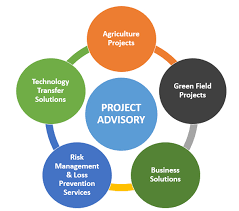Project advisory, a strategic partnership between organizations and experienced consultants, has emerged as a critical component of successful project management. By providing expert guidance, insights, and support, project advisory services can significantly enhance project outcomes, mitigate risks, and optimize resource allocation.
Understanding Project Advisory
Project advisory involves a collaborative approach where external experts work closely with project teams to offer strategic counsel and practical solutions. These advisors possess in-depth knowledge of industry best practices, project management methodologies, and emerging trends. Their role extends beyond traditional consulting to encompass a proactive partnership aimed at achieving project objectives.
Key Benefits of Project Advisory
Enhanced Decision Making: Project advisory services provide valuable insights and recommendations, empowering project teams to make informed decisions. By offering alternative perspectives and leveraging industry best practices, advisors can help identify potential challenges and opportunities, leading to more effective decision-making.
Risk Mitigation: Experienced advisors can identify potential risks early on and develop strategies to mitigate them, safeguarding project success. Through rigorous risk assessment and analysis, project advisors can help organizations proactively address threats and develop contingency plans, reducing the likelihood of project failure.
Improved Efficiency: By optimizing processes and resource allocation, project advisory can streamline operations and enhance project efficiency. Advisors can bring a fresh perspective to project methodologies, identifying inefficiencies and suggesting innovative approaches to improve productivity and reduce costs.
Access to Expertise: Project advisory brings specialized knowledge and skills, often unavailable within the organization, to address complex challenges. Advisors with deep industry expertise can provide invaluable guidance on emerging trends, technologies, and regulatory requirements, ensuring that projects align with organizational goals.
Cost Reduction: Effective project advisory can help identify cost-saving opportunities and prevent costly mistakes. By optimizing resource utilization, streamlining processes, and mitigating risks, project advisors can contribute to significant cost reductions without compromising project quality.
The Project Advisory Process
A typical project advisory engagement involves the following phases:
Project Assessment: Advisors conduct a thorough evaluation of the project, identifying strengths, weaknesses, opportunities, and threats. This comprehensive assessment provides a solid foundation for developing a tailored advisory plan.
Strategy Development: Based on the assessment, a tailored advisory plan is developed, outlining the scope of services, deliverables, and key performance indicators (KPIs). Clear objectives and metrics are essential for measuring the impact of advisory services.
Implementation Support: Advisors provide ongoing support, coaching, and mentoring to project teams. This hands-on approach ensures that the advisory recommendations are effectively implemented and integrated into project operations.
Performance Evaluation: Regular progress reviews are conducted to measure the impact of advisory services and identify areas for improvement. Continuous monitoring and evaluation are crucial for optimizing the advisory engagement and demonstrating its value.
Challenges and Opportunities in Project Advisory
While project advisory offers numerous benefits, organizations may face challenges such as:
Finding the Right Advisor: Identifying a project advisory firm with the necessary expertise and alignment with project goals can be complex. Effective sourcing and selection processes are essential to ensure a successful partnership.
Integration with Project Teams: Effective collaboration between advisors and project teams is crucial for success. Building trust and fostering open communication are key to achieving optimal results.
Cost Justification: Demonstrating the return on investment of project advisory services can be challenging. Clearly defined KPIs and measurable outcomes can help quantify the value of advisory services.
Despite these challenges, the growing complexity of projects and the need for specialized expertise create significant opportunities for project advisory firms. By focusing on delivering measurable results and building long-term partnerships, advisory services can become an indispensable asset for organizations seeking to achieve project excellence.
Conclusion
Project advisory is a strategic investment that can yield substantial returns. By leveraging the expertise of external consultants, organizations can enhance project performance, reduce risks, and achieve their business objectives. As the project landscape continues to evolve, the role of project advisory will become increasingly important in driving success.




